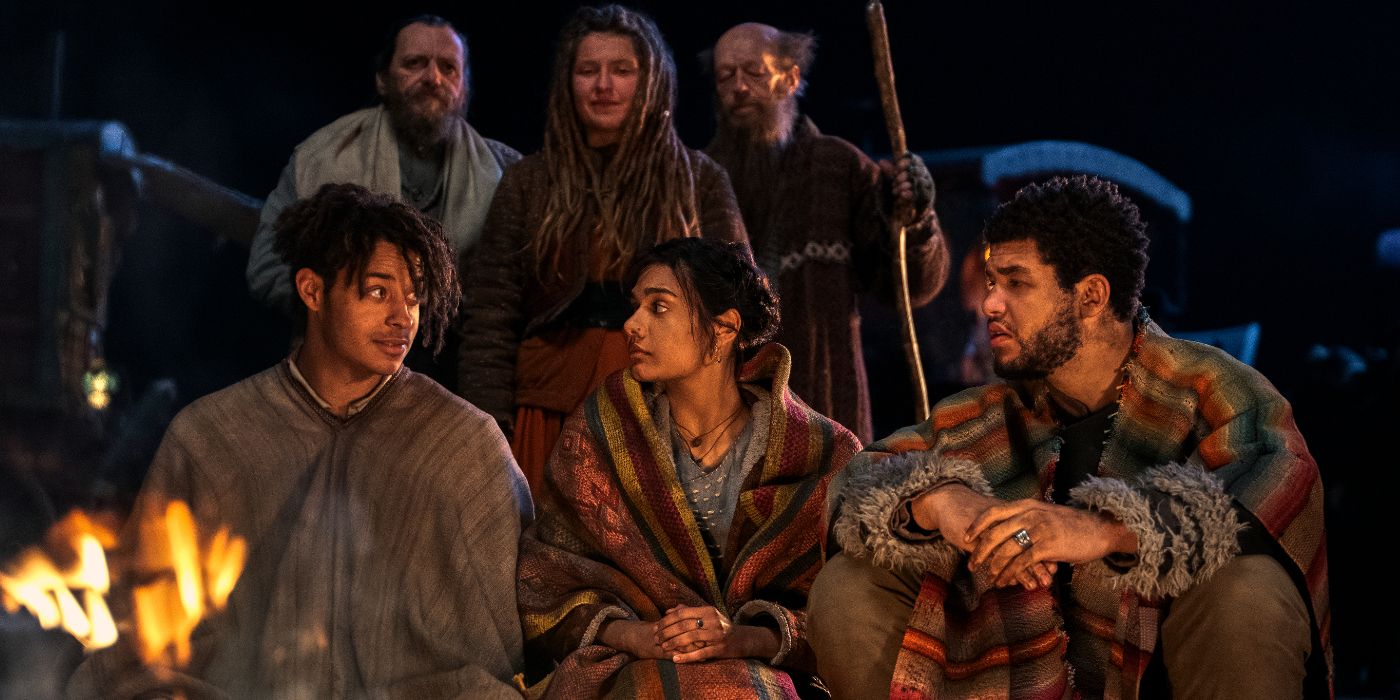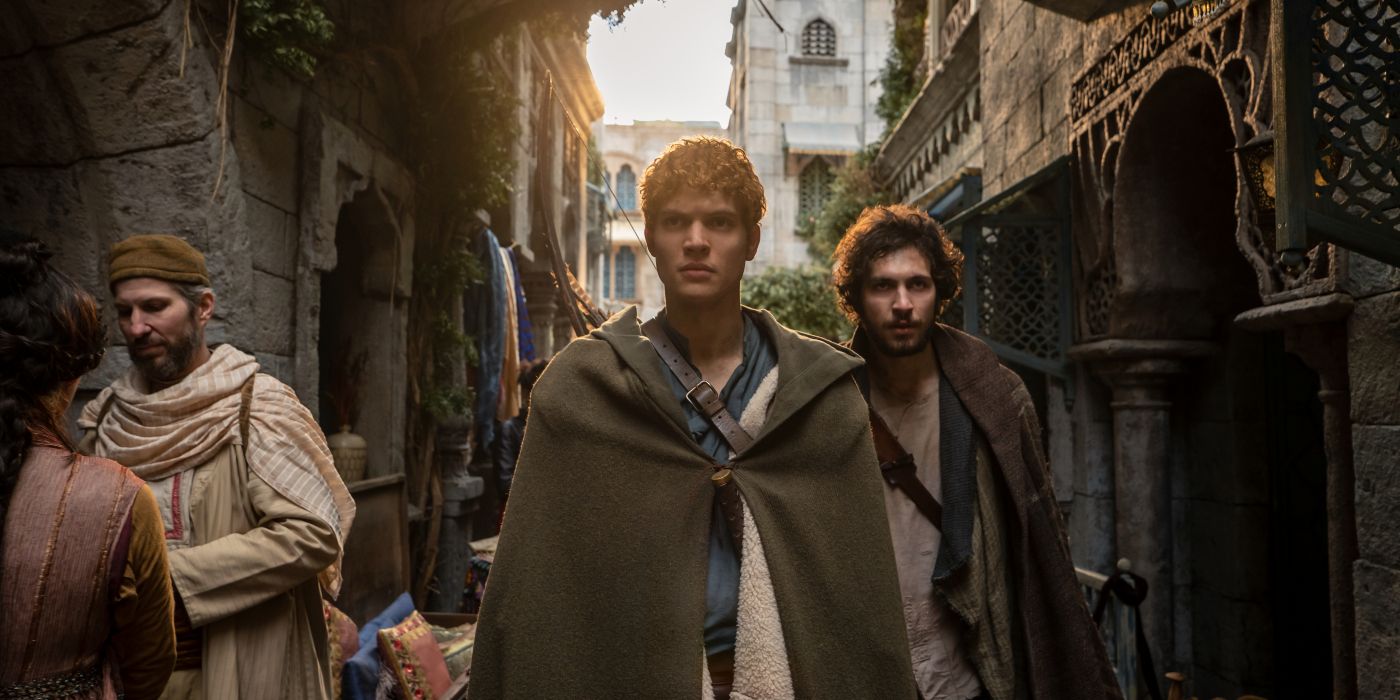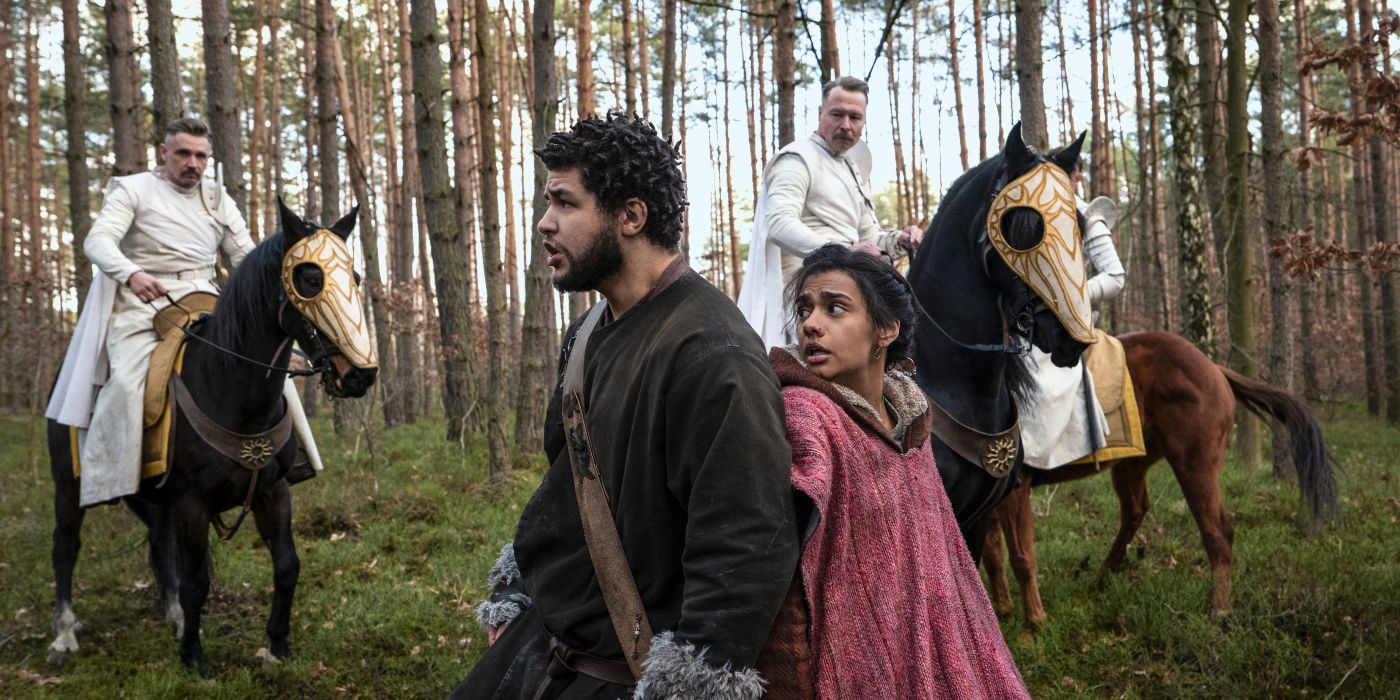The Wheel of Time premiered on November 19th on Amazon Prime Video, with new episodes released every Friday. An adaptation of Robert Jordan's bestselling book series by the same name, The Wheel of Time has drawn its fair share of both praise and criticism in part due to some notable departures from its source material. Either way, a Wheel of Time season 2 has been filming, which should allow the show to portray some very exciting moments from the 14-book series.
One of the most interesting and well-executed aspects of The Wheel of Time has to be its musical score, written by Lorne Balfe. Balfe is a renowned film, video game, and television composer with credits including Black Widow, His Dark Materials, and Mission: Impossible - Fallout, who expands on what's possible in a fantasy score with his work on Wheel of Time. Balfe spoke to Screen Rant about his creative process, his collaboration with Wheel of Time showrunner Rafe Judkins, and working on a television show during a pandemic.
Screen Rant: You're in London, right?
Lorne Balfe: Yes. Since COVID, I was doing Black Widow, I think we were a day before lockdown. And before that, I was kind of back and forth to L.A., two weeks of every month. I was half and half. So I’m in London full-time.
How did that factor into working on this, and Black Widow too? Obviously, you’ve been busy throughout this whole pandemic.
Lorne Balfe: Thankfully! It’s weird, I don’t feel I am because nothing seems to get released. Or if it does, it’s delayed by - Black Widow was a year and a half, I think? And there’s a film I’ve done called Rumble, which would have been two years - it’s so strange, but everybody’s going through the same thing.
But no - lived on Zoom. Lived on Zoom, we’ve got a program called Evercast that editors use. It’s high definition, you can have everything in surround, and visual effects houses use it. Nobody ever comes to my studio - I’m all alone now, nobody wants to interact any longer, unfortunately. But Wheel of Time, it wouldn’t have been any different because everybody was all over the place. You know, we’d just always meet on Zoom. Half the time, I didn’t know where anybody was, anyway. Rafe would be in Prague one minute, then he’d be in Britain, then it’d be Morocco, you know, all over the place.
I know for working on features, it’s pretty common for the composer to sit with the director, spot through the film, and come up with where the music comes in and out. Especially over Zoom, what was your collaboration with Rafe Judkins like, and were you able to do a similar process?
Lorne Balfe: Sort of. TV always amazes me because it’s just mammoth. If it’s 8 or 10 episodes, it’s basically four feature films. So, I think before spotting, it was really just a lot of talking and I was just intrigued… this is a passion project for all the people involved with it. Rafe, and Marigo [Kehoe], David [Brown], and Chris, and the whole team. But with Rafe, this is his blood. And when talking about things, I always love asking people when working with them, "What’s your Spotify playlist? What are you listening to when working, and writing, and creating this narrative?"
So, we spent a lot of time kind of talking about the fact… Rafe had a clear vision for the music. He just did not want to be what the cliché is, i.e., typical, what one would expect of that genre. Epic, orchestral music. Because I think that’s very, it’s Lord of the Rings territory, that. And I was kind of, for about a year, sneaking into all of the fan forums and the fan chat rooms. It was interesting reading about music, and what people were – it was all over the place. A lot of prog rock. A lot of prog rock fans, and a lot of classical stuff. It was a big mixture. But Rafe wanted a tone. He had a lot of Southern music and Cajun music as a reference, and world music.
I think that’s the thing, is that if we had gone down that route of the epic orchestra, it’s very Westernized. We’ve heard it before. So there were a lot of influences of Balinese music or Celtic music. It was kind of a big hot pot of different styles. And I think what the whole point was, is because this world is so massive and immersive, it was about writing - creating a world, creating the characters’ themes, before writing to picture. It really was about saying, "Okay, this is our color, this is our world." So the spotting happened later on in the game, more time was spent trying to create our sonic world, which was difficult. Having banjos and sitars in the same piece of music you don’t hear it often.
There is that orchestral influence here, that's definitely part of it, but a lot of these characters are from the country, from near the mountains, they’re farmers, and you do have all those folk music touches. Acoustic guitar and, like you said, banjo and stuff like that. But you also have electric guitar and some overdriven vocal production. You have some really modern touches there too.
Lorne Balfe: I think making it modern was important, not to make it just traditional 'medieval folk music.' There are no rules. I mean that’s the way we kind of looked at it. There’s no reason why it can’t have a modern drumbeat underneath it. I think this was kind of the exciting thing, that we had no rules, really.
I want to be respectful to the readers and the fans. I am one of them. When reading it ten years ago, we all create our own kind of soundtracks in our head. And it’s the same with His Dark Materials. I had a soundtrack idea, probably, when reading it originally, so I was very aware that you’re writing a piece of music and a theme that’s been somebody’s world for 20-30 years. You don’t want to ruin that. You’re never going to please everybody, it’s impossible. It’s like reading some of the comments about the show, it’s so divided. Some people feel that it wasn’t loyal to the literature, some feel it’s perfectly - it’s a difficult thing. And I think with the music, we just thought there’s no reason we can’t make it contemporary, with hints of that organic-ness in it.
Do you feel added pressure knowing that there are all these devoted fans out there? You’ve done Black Widow also, so you’re no stranger to that.
Lorne Balfe: All the time! All the time. I think there’s always pressure, and feeling intimidated and feeling worried. I think it’s the same when working on a film. When I did Terminator, I was very conscious of the theme. And the fact that when I watched those original movies - the feeling I got when I heard that symbolic rhythm.
And the same with Mission: Impossible! Being able to touch Lalo Schifrin’s theme, you get very nervous, but then you’ve just got to put it to the side and get on with it. So it’s always intimidating. If it wasn’t, I think we’d be in the wrong job. But then, maybe that’s just my flaw.
One of the really cool things about the music for this show is that you have lyrics in the Old Tongue, which is the language from the book series. Whose idea was that, and did you collaborate with anyone on those lyrics?
Lorne Balfe: Yeah, it was my idea, and I should’ve thought twice about it I think because every word gets scrutinized and analyzed. And then it’s like, "That’s wrong! You’ve got plural tense in it!" It was very intimidating.
But we worked – there was a fantastic dialect and language coach on the show. She was able to help us. The show was the inspiration for the words, but translating into a different language then changed the whole concept of it. And also, for the singers learning the language, that’s another thing, having to get things phonetically written out. But the way I looked at it was, I want to try to do the show like an opera, and basically have it so that, for those that are able to – which I didn’t think was that many, but there’s quite a few that are translating it - when watching the show, the vocals are the narrative to the scene. So the vocals aren’t just random sentences. They’re to do with actually supporting the storyline of the scene and a character’s development.
I think normally with soundtracks, we get a lot of generic-ness, or just ‘aahs’ and ‘oohs’ and no actual wording. So with this, it was an actual narrative to all the scenes. And Michael, who works with me, he basically had a lot on his shoulders with going through the lyrics, because it was - we knew one mistake, and we’d be destroyed! There’d be memes made about it, destroying us.
The soundtrack - they’re standalone themes and standalone pieces, so what’s the process like incorporating those into the actual score for the show?
Lorne Balfe: Once each character or concept of theme was written, like the Trollocs for example, we then just started getting it into the temp, making our own temp score with our own music. So instead of trying to borrow from other films and other projects, we just created our own temp score. And then we were able to kind of see where that would go. Because obviously, you’re dealing with characters that are going to be there more than just one season. So it’s about, "Is there longevity with this theme?" So there was a lot of writing and doing variations of it.
With the Trollocs it’s a good example because it’s kind of easy to do the pantomime camp villain theme. Where it’s very kind of, you know it’s the villain. And we wanted to add a bit of soul, even though they probably don’t have one. Trying to kind of give them a soul, because there’s always a reason. I think some of the darkest and haunting scores are those where they portray villains with emotion. It’s like Anthony Hopkins in Hannibal. It’s a dark romantic score that’s disturbing, because you see that this person is in love with Clarice, basically. Instead of playing it as pure evil, there’s reasoning there.
But yes, that was the kind of process with trying. And with TV, I’ve always got so much respect for those full-time TV composers that work on those network shows, where they’re turning over an episode a week. I don’t know how you sleep and breathe! So, we’d be recording episode 1, but also trying to write episode 4 at the same time. It’s a big eye-opener, and you need a good team around you, and people that you trust to get you through it.
You started out as a percussionist, right? Playing with a symphony?
Lorne Balfe: Allegedly! I think I was all right. I wasn’t very good, but I enjoyed it.
How do you compose the themes for something like this? Do you sit at the piano, or are you humming things? How does it work?
Lorne Balfe: I like to print out and have next to me who the character is. And if time is willing, spend days or weeks just trying to immerse myself into that character. And I write down keywords about them, characteristics, who they are emotionally, and basically try to figure out that way who they are as a person. And then I start writing their theme, and also, their own sonic identity.
It’s not always just about a melody, because we’ve all got our own characteristics. And we wanted to do some research in instruments also. There are interesting instruments we discovered like the carnyx, which is a Roman instrument. And mixing that with modern technology also, so we’ve got this interesting hybrid.
But it all starts, I kind of always say that my instrument’s the computer these days. I sit in front of a computer; I wish I had the room for a piano! It’d be lovely. A roaring fire with candles everywhere… but it’s very much a keyboard and a computer, and just trying to figure out what is the soul of this character that we’re looking at. And the great thing is, when you’re doing something that’s literature-based, you can really just go down all these rabbit holes online and see how the audience also feels about them.
You have a Grammy award for working on The Dark Knight. I know you’ve been Emmy nominated, how do you plan on also getting a Tony and an Oscar?
Lorne Balfe: It never goes further than "nominated" anyway! My son has pointed that out, "Why does nothing ever say win, only nominated?"
What I mean is, is there something else you’re working on right now that you’re excited about? Or are you just totally immersed in this? Or both?
Lorne Balfe: I've finished for the moment. So I won’t start, probably, until the second quarter of next year. I’m in the Mission: Impossible world at the moment, so I’m fully immersed in that world. It’s an honor to be able to work on scenes where you have Tom Cruise doing stunts I’d have an asthma attack just thinking about. So, that’s my world at the moment. But it’s like everything.
I’d finished working with Michael Bay half, maybe half a year ago, and our movie Ambulance is still not out. And I’m working on a video game that now won’t come out for another two years. COVID has just pushed everybody’s schedule to another planet. So it’s a weird time.
New episodes of Wheel of Time release every Friday on Prime Video.



